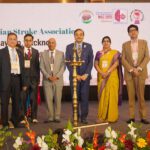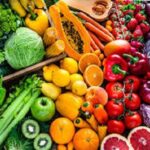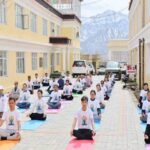New Delhi, December 19, 2020 :
- Today is International Migrants Day. To better understand the impacts of COVID-19 in refugee and migrant populations, WHO and a research consortium led by Ghent University and the University of Copenhagen, has conducted a global survey called ‘ApartTogether’.
- It shows that people living on the streets and in asylum centers are less likely to seek care if they have symptoms of COVID-19. More than half of those surveyed said that COVID-19 has caused them depression, worry, anxiety and loneliness.
- Investing in the health of migrants is not just the right thing to do, it also has long-term benefits for social cohesion and economic development. It’s also vital that migrants and refugees are included in plans for the rollout of vaccines against COVID-19.
- Earlier today, WHO and our COVAX partners Gavi, CEPI and UNICEF announced that we have secured agreements to access 2 billion doses of several promising vaccine candidates. These unprecedented agreements mean that all 190 countries and economies participating in COVAX will be able to access vaccines to protect vulnerable groups in their populations during the first half of next year.
Good morning, good afternoon and good evening.
On Monday, I ended our press conference by sending my best wishes to UNHCR, the UN Refugee Agency, for its 70th birthday.Today is International Migrants Day, and I am delighted to be joined by António Vitorino, Director-General of the International Organization of Migration.
IOM is our next-door neighbour here in Geneva, and our close partner.In recent years, we have witnessed the largest population movements and displacement since the end of the Second World War.Too often, migrants and their families remain outsiders in their adopted communities, even years after migrating.
They face discrimination, social exclusion and lack of access to health services. And yet migrants make enormous contributions to our societies, with new ideas that drive economic and social innovation.That is also true in the COVID-19 response. It was Turkish migrants to Germany who founded the company that developed the first COVID-19 vaccine to be approved and rolled out.
And it was a nurse from the Philippines who administered the first dose of that vaccine in the UK. All around the world, many health workers are migrants, especially women, who account for 70% of the global health workforce.
When the World Health Assembly designated 2020 as the International Year of the Nurse and Midwife, none of us had any idea how much we would rely on nurses, midwives and other health workers to keep us safe in the face of a global pandemic.
We all owe a huge debt of gratitude to the nurses and midwives who are often the first and only health professionals present to treat and comfort the sick and dying and bring new life into the world.
Together with Women in Global Health, the International Council of Nurses, the International Confederation of Midwives, the United Nations Population Fund and Nursing Now, we yesterday launched a list of 100 outstanding women nurses and midwives from around the world who have made an exceptional contribution to nursing and midwifery.
They represent millions of nurses and midwives who use their knowledge and expertise on a daily basis to protect the health and lives of others, at times putting themselves in harm’s way to do so.
To better understand the impacts of COVID-19 in refugee and migrant populations, WHO and a research consortium led by Ghent University and the University of Copenhagen, has conducted a global survey called ‘ApartTogether’.
The survey was supported by several partners and included almost 30 thousand migrants and refugees in almost all WHO Member States. It shows that people living on the streets and in asylum centers are less likely to seek care if they have symptoms of COVID-19.
Of those who reported not seeking healthcare, 35% said it was because of financial constraints, and a further 22% said it was fear of deportation.
More than half of those surveyed said that COVID-19 has caused them depression, worry, anxiety and loneliness.These findings paint a bleak picture, but they also point the way forward.
There are several measures countries can take to include refugees and migrants in response plans and public health measures. Access to care must not be linked to legal status. Improving internet access for migrants is also important for improving access to information.
And most crucially, we call on all countries to remove financial and other barriers to care for migrants, as part of their journey towards universal health coverage. Health for all means all, including migrants.
That means increasing investments in health, especially in primary health care, to create health systems that are sensitive to migrants’ needs, their languages, and their health problems.
These include reproductive and child health, mental health, trauma from injuries, violence, and sexual abuse and assault. Investing in the health of migrants is not just the right thing to do, it also has long-term benefits for social cohesion and economic development.
Exclusion is costly in the long run, but inclusion pays off for everyone. It’s also vital that migrants and refugees are included in plans for the rollout of vaccines against COVID-19. As you know, the ACT Accelerator, which includes the COVAX Facility, was established to ensure access to vaccines for the world’s poorest and most vulnerable people – many of whom are migrants.
Earlier today, WHO and our COVAX partners Gavi, CEPI and UNICEF announced that we have secured agreements to access 2 billion doses of several promising vaccine candidates.
I would like to thank Canada and Prime Minister Trudeau for committing to share surplus doses of COVID-19 vaccines. These unprecedented agreements mean that all 190 countries and economies participating in COVAX will be able to access vaccines to protect vulnerable groups in their populations during the first half of next year.
This week I have spoken with CEOs of pharmaceutical companies, and met with European Commission President Ursula [von der Leyen] and President Charles Michel in Brussels, to ensure that we start vaccination as soon as possible in the new year.
WHO and our COVAX partners are working non-stop to start vaccination as soon as possible in the new year. And WHO remains committed to working closely with IOM and many other partners to support countries in improving the health of migrants, during the pandemic, and after it is over.
It’s now my great pleasure to introduce António Vitorino, Director-General of the International Organization of Migration, to say a few words.
António, the floor is yours.
healthysoch







